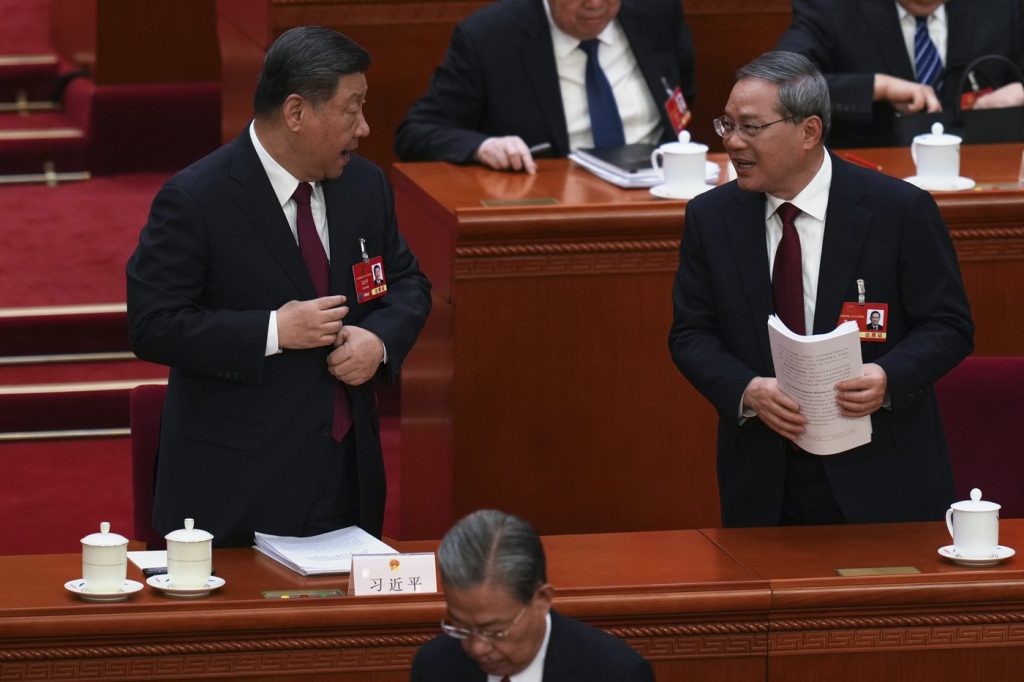BEIJING (AP) — This week, significant speeches by two of the world's most influential leaders highlighted the contrasting strategies being employed by major powers to fulfill their national aspirations. The speeches, delivered within an hour of each other, exemplify the divergent paths taken by China and the United States in pursuit of their respective ambitions.
Chinese Premier Li Qiang addressed the National People's Congress in Beijing, speaking to nearly 3,000 representatives from a population of 1.4 billion. His address stressed unity and the importance of "opening up," a long-standing concept in Chinese politics, as a means to overcome challenges and achieve national rejuvenation.
Conversely, President Donald Trump spoke to both chambers of the U.S. Congress in Washington, D.C., an event featuring over 500 lawmakers representing a nation of 340 million. An hour later, he pledged to impose tariffs on imports and combat inflation, echoing his campaign slogan to "make America great again."
While the speeches unfolded thousands of miles apart, both leaders expressed a desire for greatness amid tensions as the current superpower and its primary challenger find their interests increasingly at odds.
Divided Democracy vs. Authoritarian Unity
Li's speech, lasting approximately 55 minutes, was a formal presentation delivered in front of a supportive audience in the Great Hall of the People on Tiananmen Square. China's top leader, Xi Jinping, was present, and the delegates responded with polite applause at strategic points throughout Li's address.
In stark contrast, Trump's address, which extended to 1 hour and 40 minutes, took place in the Capitol building on the National Mall, surrounded by American monuments. The event reflected a divided Congress, and reactions varied widely, with Republicans cheering and Democrats demonstrating stony silence or protesting. One Democrat was even ejected for interrupting the president.
Such moments of unrest are virtually unheard of in China, where the one-party state suppresses public dissent and maintains an appearance of unity. In his remarks, Li emphasized solidarity and urged greater alignment with Xi's leadership.
On the other hand, Trump lamented the inability to make Democrats "happy" or to elicit applause, describing his predecessor, Joe Biden, as "the worst president in American history."
Tariffs vs. Globalization
Trump highlighted a buoyant economic outlook, promising to combat inflation and cut energy costs. He announced a plan to impose more tariffs on imports, positioning them as a way to bolster U.S. industries while potentially disrupting the global trade system and impacting China's export-driven economy. "Plants are opening up all over the place," Trump stated, attributing this resurgence to his administration's policies.
Conversely, Li expressed concerns about deflation impacting China and acknowledged challenges such as falling real estate prices and weak consumer spending. He reaffirmed Beijing's unwavering commitment to opening up and expanding its "globally oriented network of high-standard free trade areas."
Leaving Climate Accord vs. Green Transition
Trump boasted about withdrawing from the Paris Climate Accord and promoting his "drill, baby, drill" energy strategy, claiming his actions protected American auto workers. Meanwhile, Li's focus was on advancing a green transition, emphasizing its importance across all economic sectors and claiming that China would actively pursue carbon neutrality.
Li underscored the significance of innovation and technology development in China, particularly in artificial intelligence, which many U.S. officials believe could challenge America's technological leadership and impact the economic and military rivalry between the two countries.
While Trump made minimal reference to technological advancements in his speech—only mentioning military improvements—Li briefly touched on defense, declaring that China would expedite the development of new combat capabilities.
MAGA vs. Chinese 'Rejuvenation'
Both countries exhibit a yearning for restored greatness. The U.S., having transitioned from a rising power to a dominant superpower in the latter half of the 20th century, remains the world leader in both economic and military strength. In contrast, as China rises, its interests increasingly clash with those of the U.S. and its allies over trade, technology, and territorial disputes in the Pacific.
China leverages its control over domestic media to highlight America’s divisions and challenges, promoting its authoritarian model as a preferable alternative to democratic chaos. In his speech, Trump emphasized renewed American momentum, pride, and the revival of the American Dream, claiming the nation was on the brink of a resurgence.
Moreover, Xi has articulated the concept of the "Chinese Dream," which envisions the nation's restoration to a historical position of greatness. China seeks not to dominate in the American sense but to be viewed as an equal in shaping global norms traditionally governed by the U.S.
Conversely, Trump appears focused on extricating the U.S. from global agreements, having withdrawn from numerous international organizations, including the Paris Agreement, which he cited as one of his achievements. As Trump's administration retreats from global responsibilities, China may perceive an opportunity to assert itself more prominently on the world stage.
In conclusion, both leaders’ addresses reveal stark ideological divergences, reflecting their nations' contrasting approaches to global leadership. As Li proclaimed the need to "build a great country" and advance national rejuvenation, the two nations seem poised for an era marked by competition and ideological rivalry.










